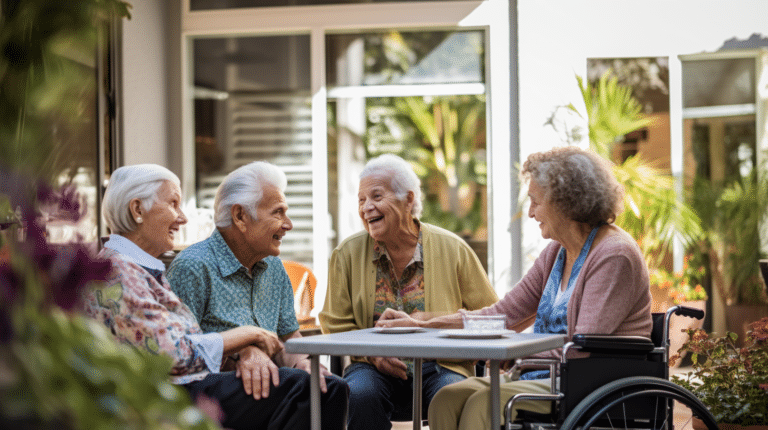Senior living communities are, thankfully, no longer the scary, smelly, horrible place they once were perceived to be. If anything, senior living has gone in the complete opposite direction.
Today, senior living communities have become a destination hot spot due to their luxury resort-like feel. Most communities now have a culture of creating an attractive lifestyle full of convenient services and jaw dropping beauty. Five-star dining, spa and beauty services, and a calendar full of education and activities often leaves people saying, “Why didn’t I move here sooner?”
So how do you know if you or your loved one is ready to move? While visible physical decline, the onset of dementia, or a new medical condition may be obvious signs that one can no longer stay safe at home, there are many other subtle signs that it may be time.
Social Factors:
Battling loneliness, isolation, and depression can take its toll on anyone, especially the elderly. For and senior including married couples or those living alone, if these mental health issues are. addressed, they can have a serious negative affect on their health and well-being. Loneliness and isolation can lead to a wide variety of medical issues. Such issues can include, bu. e not limited to depression, heart disease, and an overall decline in cognition.
Here are some signs that you or your loved one might be ready for senior living:
- You occasionally feel lonely or bored. Or depression is starting to be a concern.
- You don’t want to just sit around. You want to have fun living your best life. You’re looking to make friends, go on adventures, learn something new, take exercise classes, eat out.
- You want to “play tourist” in your own community and learn all it has to offer, and you prefer to not do it alone.
- Having an activity calendar or regularly planned activities with your friends or others your age sounds like a fun time.
- You or your loved one stops doing the regular activities they love (like church, cooking, gardening, etc).
- You notice your loved one has become more withdrawn.
Environmental Factors:
It is not uncommon the elderly to be living in the same home for an entire lifetime. Keeping up with the maintenance, home hazards and a lifetime of clutter can put a loved one at risk.
Here are some signs that you or your loved one might be ready for senior living:
- You feel like your home is too big and has too much work and you don’t want to deal with the maintenance or yard work.
- You’re concerned that the layout of your home is not conducive with aging in place. Multi-level homes & narrow doorways and hallways might make the use of a walker or wheelchair more difficult.
- There is concern about falling or injuring yourself in your home.
Activities in Daily Living
It’s no secret that as we age, the ability to keep up with normal daily living activities gradually becomes more difficult. Our loved ones may not want to admit it but, roughly two-thirds of the elderly population will need help doing one or more activities of daily living. However, they may not be willing to ask for help, which in turn greatly increases the risk of injury.
Here are some signs that you or your loved one might be ready for senior living:
- You find it more difficult to do the things you want to do.
- Independent Activities of daily living, such as laundry, vacuuming, cleaning, is growing more difficult or burdensome.
- Activities of daily living, such as toileting, bathing, and dressing, are growing more burdensome.
- Hygiene and grooming become a concern.
- You find the convenience of not having to clean, unless you want to, very entertaining.
- The idea of cooking daily meals is now more stressful than fun.
- You find yourself eating less or your diet is less healthy. There is constantly spoiled food in the fridge. Or the fridge is constantly empty.
- The stress of driving to the grocery store or shopping or leaving your home is increasing.
Medical/Health Factors:
They say it takes a village to age successfully. And having nurses, aids, doctors that come to you, and a whole community of people who have your best interests at heart all in one senior living community is a great start to building that community.
Here are some signs that you or your loved one might be ready for senior living:
- Your loved one is becoming more and more forgetful.
- Managing medications is becoming increasingly dangerous or difficult.
- You find your loved one not dealing with more health issues, or getting prescriptions, or complaining about too many doctor visits.
- Having someone around 24 hours a day would make you feel more confident and safer.
- Your loved one is no longer active, or their mobility and ambulation is declining.
- You have noticed frequent injuries or bruises.
Other Factors:
- Being able to safely drive is becoming a concern for you or your loved one.
- There are concerns about managing finances. Abnormal spending, unpaid bills, unopened mail
- You are starting to talk about Medicaid planning.
- More and more people have encouraged you to check out senior living communities.
Here are some considerations to keep in mind when researching the right senior housing fit for yourself or a loved one:
Physical and medical needs
Does the level of care offered meet your current and potentially future needs?
What personal care services are available? What medical personnel are on-site?
How is the building’s accessibility? Are proper safety measures in place?
Do the building layout and its grounds meet your needs or limitations?
Is the facility and its staff properly licensed?
Is there adequate staffing in place?
Location
Will it enable you to be close to family and friends?
What is its proximity to activities, local attractions, or accessible transportation?
Is the location close to my existing doctors and hospital?
Daily living needs
How much home maintenance is required or offered?
What services are offered? (i.e. meals, transportation, housekeeping services, medical care, etc.)
Do the current residents seem comfortable and well-cared for?
Are the buildings and its grounds clean and maintained?
Social life
- What is the social environment like? What activities and amenities are available?
- Does the staff seem friendly and helpful? Do residents seem happy and fulfilled?
- Are pets allowed?
Cost and affordability
- What is the monthly/yearly cost? What are the fees?
- What is included in the costs and what is extra?
- How will you pay for it?
- Do they accept Medicaid?
If you or an aging loved one are considering home care in Milwaukee, WI please contact the caring staff at Talem Home Care & Placement Services today. Call (414) 206-2090
At Talem Home Care of Milwaukee, we provide passionate, understanding, and flexible caregivers in Brookfield, Cudahy, Delafield, Franklin, Greendale, Greenfield, Hales Corners, Milwaukee, Mukwonago, Muskego, New Berlin, Oak Creek, Oconomowoc, Pewaukee, Shorewood, South Milwaukee, Waukesha, Wauwatosa, West Allis and surrounding areas in Wisconsin.
- Is Laughter Truly Full of Health Benefits for Seniors? - April 9, 2025
- Senior Care Tips: Is it Just a Common Cold? - March 20, 2025
- Exploring Memory Strategies for Seniors - March 7, 2025







